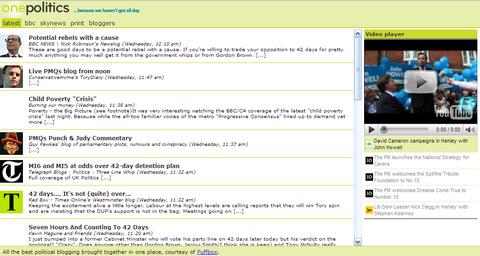Like everyone else, I’m trying to make sense of David Davis’s decision to resign his Commons seat, and fight a by-election to win it back. He says he’s trying to start a national debate on ‘one of the most fundamental issues of our day.’ But when it comes to the vote, assuming he wins, he’ll only get a mandate from 1/643 of the country. In a seat he was already safe in, with his nearest challengers (the LibDems) not fielding a candidate. Result: we’ll end up exactly where we started, with a Conservative MP representing Haltemprice and Howden.
Nick Robinson offers a list of ten solid reasons why it’s potentially nuts. By any conventional measure, he doesn’t have a lot to gain… which leads me to think of something else.
We’re constantly hearing about general public disinterest in politics, but a continuing – and growing? – interest in ‘single issues’. Taking him at his word, David Davis is attempting to redefine himself as the nation’s Mr Liberty, effectively abandoning – or certainly, putting on hold – a successful conventional political career.
If Davis is to really pull this off, he needs to position himself at the heart of a national grassroots political campaign, crossing traditional party boundaries. It’s hard to imagine how he can do this without some kind of ‘politics 2.0’ initiative – joining up with existing online-led campaigns like NO2ID, perhaps, and confronting big hitters like ConservativeHome (who got a mention at PMQs on Wednesday, and are now voicing some regrets). Yet at the moment, his personal website (www.david-davis.co.uk) has been subsumed into conservatives.com.
At the other extreme, there’s the ‘playing chicken’ theory, which suggests that if Labour are so sure they’ve got public support on 42 days, let’s see them prove it. Except that in 2005, Davis got 47.5% of the vote, versus just 12.7% for the Labour candidate: hardly a level playing field. And it would be odd for a senior Shadow Cabinet member to lead such a ballsy party-political initiative (apparently) unilaterally.
One other cynical thought crosses my mind. With the Tories under Cameron riding high in the polls, there’s really no prospect of Davis ever getting the Ultimate Prize now. He might have nothing to gain by doing this; but perhaps he’s got nothing to lose either. Worst case, he bows out in glory, a hero, a man of principle.
If nothing else, the next few weeks will make for a very, very interesting spectacle. If single-issue politics really is the order of the day, here’s its big test. The implications could be staggering.


 That said, it isn’t exactly difficult (in most cases) to add these buttons: at code level, it’s usually just a case of tacking the ‘permalink’ on the end of a base URL. And I guess it makes the point that you’re ‘down with this sort of thing’.
That said, it isn’t exactly difficult (in most cases) to add these buttons: at code level, it’s usually just a case of tacking the ‘permalink’ on the end of a base URL. And I guess it makes the point that you’re ‘down with this sort of thing’.
 There’s a new look to the
There’s a new look to the  Late last year, I
Late last year, I